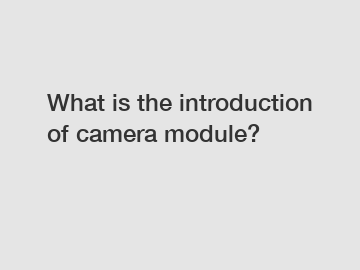Jan. 22, 2024
Consumer Electronics
Understanding Camera Modules.
A camera module, also known as an image sensor module, is an electronic device that captures and processes digital images. It is a compact unit that consists of an image sensor, a lens, and various other components such as filters, flash modules, and control electronics. The image sensor, usually a CMOS or CCD sensor, acts as the primary component responsible for capturing light and converting it into electrical signals.
Components of a Camera Module.

1. Image Sensor:
The image sensor is the heart of a camera module. It comprises millions of light-sensitive pixels that detect light and convert it into electrical signals. The two most common types of image sensors used in camera modules are CMOS (Complementary Metal-Oxide-Semiconductor) and CCD (Charge-Coupled Device).
2. Lens:
The lens is another crucial component of the camera module. It focuses the light coming from the subject onto the image sensor, ensuring sharp and clear images. Various types of lenses are used, including fixed-focus lenses, auto-focus lenses, zoom lenses, and wide-angle lenses, depending on the camera module's application.
3. Filters:
Filters are utilized to improve the image quality by eliminating unwanted light wavelengths or enhancing specific colors. Some common filters used in camera modules are UV filters, IR filters, and color correction filters.
4. Flash Modules:
In low-light conditions or when capturing images in dark environments, flash modules provide additional light to illuminate the subject correctly. LED or Xenon flash modules are commonly used in camera modules.
Applications of Camera Modules.
1. Smartphones and Tablets:
Camera modules are extensively utilized in smartphones and tablets, allowing users to capture photos and videos easily. The advancements in camera modules have contributed significantly to the rise of mobile photography, with smartphone cameras rivaling some dedicated digital cameras.
2. Digital Cameras:
Camera modules are the primary components in dedicated digital cameras. As technology has evolved, digital cameras have become more versatile, offering advanced features such as high-resolution sensors, image stabilization, and manual controls.
3. Surveillance Systems:
Camera modules play a crucial role in surveillance systems by capturing and recording video footage. Whether it's in homes, offices, or public areas, camera modules are used to monitor and enhance security.
4. Automotive Industry:
Camera modules have found their way into the automotive industry as well. They are used in rear-view and surround-view cameras to assist drivers while parking or maneuvering their vehicles. Additionally, camera modules are integral in advanced driver-assistance systems (ADAS) such as lane departure warning and collision avoidance.
Conclusion.
In conclusion, camera modules are essential components in capturing digital images and videos. Their integration into various devices has revolutionized the way we document our lives and interact with technology. From smartphones to digital cameras, surveillance systems to the automotive industry, camera modules have become ubiquitous. As technology continues to advance, the capabilities of camera modules are only expected to grow further, pushing the boundaries of what is possible in the realm of photography and visual communication.
If you have any further questions or inquiries about camera modules, please do not hesitate to contact us.
If you want to learn more, please visit our website 1.3 Mp Resolution, Micro Module Camera, Led Camera Module.
If you are interested in sending in a Guest Blogger Submission,welcome to write for us!
All Comments ( 0 )